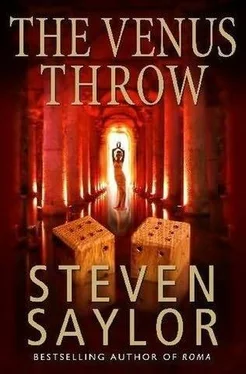Steven Saylor - The Venus Throw
Здесь есть возможность читать онлайн «Steven Saylor - The Venus Throw» весь текст электронной книги совершенно бесплатно (целиком полную версию без сокращений). В некоторых случаях можно слушать аудио, скачать через торрент в формате fb2 и присутствует краткое содержание. Жанр: Исторический детектив, на английском языке. Описание произведения, (предисловие) а так же отзывы посетителей доступны на портале библиотеки ЛибКат.
- Название:The Venus Throw
- Автор:
- Жанр:
- Год:неизвестен
- ISBN:нет данных
- Рейтинг книги:3 / 5. Голосов: 1
-
Избранное:Добавить в избранное
- Отзывы:
-
Ваша оценка:
- 60
- 1
- 2
- 3
- 4
- 5
The Venus Throw: краткое содержание, описание и аннотация
Предлагаем к чтению аннотацию, описание, краткое содержание или предисловие (зависит от того, что написал сам автор книги «The Venus Throw»). Если вы не нашли необходимую информацию о книге — напишите в комментариях, мы постараемся отыскать её.
The Venus Throw — читать онлайн бесплатно полную книгу (весь текст) целиком
Ниже представлен текст книги, разбитый по страницам. Система сохранения места последней прочитанной страницы, позволяет с удобством читать онлайн бесплатно книгу «The Venus Throw», без необходимости каждый раз заново искать на чём Вы остановились. Поставьте закладку, и сможете в любой момент перейти на страницу, на которой закончили чтение.
Интервал:
Закладка:
Clodia's horti were unusually close in. A hundred years ago, the property must have been well out in the countryside, but the city had greatly expanded since then. It was an enviable location for a piece of riverfront property and must have been in her family for generations.
The impression of great age was reinforced by the grounds them-selves, which on such a warm, windless day had the feeling of a place where time stopped long ago. The immediate approach was a long, narrow lane bordered by sprawling berry bushes which met overhead, shading the way. This tunnellike path opened onto a broad field of grass kept closely mown by a pair of goats which bleated at our approach. Facing the meadow and perpendicular to the river, which was almost entirely obscured by an intervening stand of dense trees, was a long narrow house with a red-tiled roof and a portico running along the whole front. The open meadow was as private as any walled garden in the city, for the view on all sides was shielded by tall cypress trees and majestic yews.
"She won't be in the house, but I suppose we can take a look all the same," said Trygonion.
We crossed the meadow and stepped under the shade of the portico. Trygonion rapped on the nearest door, then pushed it open and stepped over the threshold, beckoning to Belbo and me. Each room of the long house opened onto the next, and every room had its own door onto the long portico, so that one could walk from end to end of the house either along the shaded outdoor walkway or through each room in succession.
I could tell at once that the house was empty. It had the feeling of a place left unoccupied all winter, which had not yet been brought back to life. The air was still and cool inside, the walls and the sparse furnishings exhaled a slightly musty, odor, and every surface had a thin coating of dust.
We followed Trygonion slowly from room to room as he called
Clodia's name. In some of the rooms, dropcloths covered every object. In other rooms the cloths had been pulled away, apparently quite recently, for they still lay carelessly crumpled on the floor. Having acquired a furnished house on the Palatine, I know a few things about furniture. The pieces I saw in Clodia's house on the Tiber were of the sort which fetch astonishing prices at auction nowadays, especially among our burgeoning empire's new rich who have no such treasures in their obscure families-sleeping couches saved from the flames of Carthage, their plush cushions so faded that the exotic patterns can barely be made out; gilded cabinets and trunks with massive iron hinges of a sort no longer made; ancient folding chairs that the Scipios or the Gracchi brothers might have sat on.
There were paintings as well, in every room, and not theatrical wall paintings such as are fashionable among the wealthy nowadays, but portraits and historical scenes painted in encaustic on wood and mounted in elaborate frames. These were darkened by age, their smooth surfaces covered by a skein of very fine cracks. Collectors set great store by these qualities, which time alone creates and which cannot be mimicked by human artists. There were also tiny sculptures mounted here and there on pedestals, none of them taller than a man's forearm, in keeping with the small scale of the rooms, and all of rustic subjects to match the rustic mood of the place-little statues of Pan and Silenus, of a slave boy pulling a thorn from his foot, of a wood nymph kneeling on a rock.
We came to the end of the house and stepped back onto the covered portico. Trygonion peered toward the woods on the opposite side of the meadow, where I could see nothing. "No, she wouldn't be over at the kitchens or the slave quarters or the stable," he said. "She's down by the water, of course." We set out across the meadow again, toward the grove of trees along the river. In their shade, we came upon a statue of Venus- not a small, decorative object like those in the house, but a magnificent, towering bronze upon a marble pedestal. The goddess looked out on the water with an expression of almost smug contentment on her face, as if the river flowed merely to give music to her ears, and the city on its further bank had been erected for no other purpose than to amuse her.
"Extraordinary," I whispered. Beside me Belbo stared up at the statue dumbly, a look of religious awe on his face.
"Do you think so?" said Trygonion. "You should see the one at her house in the city." He turned and walked on, humming a hymn to Cybele. His mood seemed to lighten with each step that brought him closer to the river, and to the red and white striped tent pitched on the bank.
We stepped out of the trees and into the sunlight. A mild breeze stirred the lush grass. The tent stood out in dazzling relief against the bright green grass, the darker green of the river beyond, and the glaring azure sky above. Its fine silk panels shivered in the delicate breeze. The red stripes wavered like slithering snakes against a field of white, then, by a trick of the eye, the illusion was reversed and the stripes became white snakes against a field of red.
From somewhere I heard the sound of splashing, but the tent and the high trees on either side blocked my view of the river.
"Wait here," said Trygonion. He stepped inside. A little later he stuck his head out the flap. "Come in, Gordianus. But leave your body-guard outside."
As I moved toward the flap it was pulled aside by an unseen slave within. I stepped into the tent.
The first thing I noticed was the scent, a perfume I had never smelled before-elusive, subtle and intriguing. The instant I first smelled it, I knew I would never forget it.
The red and white silk softened the bright sunlight, filling the tent with a warm glow. The panels facing the river had been rolled up, letting in the view and framing it like a picture. Sunlight danced on the green water and cast lozenges of light into the tent, where they flitted and danced across my hands and face. I heard the sound of splashing again and now I saw its source, a group of young men and boys, fifteen or more, who frolicked in the water just beyond the tent. Some of them wore bright-colored scraps of cloth about their loins, but most were naked. Beads of water clung to their sleek flesh; in the sunlight they glimmered as if chased with jewels. When they moved into the shade beneath trees they became dappled, like spotted fauns. Their splashing caused the lozenges of light to dance wildly inside the tent.
I walked toward the center of the tent, where Trygonion awaited me with a beaming smile on his face. He stood beside a high couch strewn with red and white striped pillows, holding the hand of the woman who reclined upon it. The woman was turned so that I could not see her face.
Before I reached the couch a figure suddenly appeared before me. She looked hardly older than a child but wore her auburn hair coiled atop her head and was dressed in a long green gown. "Mistress!" she called, keeping her eyes on mine. "Mistress, your guest is here to see you."
"Show him to me, Chrysis." The voice was sultry and unhurried, deeper than Trygonion's but unmistakably feminine.
"Yes, Mistress." The slave girl took my hand and led me before the couch. The smell of perfume grew stronger.
"No, no, Chrysis," her mistress said, laughing gently. "Don't put him directly in front of me. He's blocking the view."
Chrysis tugged playfully at my hand and pulled me to one side.
"That's better, Chrysis. Now run along. You, too, Trygonion-let go of my hand, little gallus. Go find something for Chrysis to do up at the house. Or go look for pretty stones along the riverbank. But don't let one of those river satyrs catch either one of you or who knows what might happen!"
Chrysis and Trygonion departed, leaving me alone with the woman on the high couch.
Читать дальшеИнтервал:
Закладка:
Похожие книги на «The Venus Throw»
Представляем Вашему вниманию похожие книги на «The Venus Throw» списком для выбора. Мы отобрали схожую по названию и смыслу литературу в надежде предоставить читателям больше вариантов отыскать новые, интересные, ещё непрочитанные произведения.
Обсуждение, отзывы о книге «The Venus Throw» и просто собственные мнения читателей. Оставьте ваши комментарии, напишите, что Вы думаете о произведении, его смысле или главных героях. Укажите что конкретно понравилось, а что нет, и почему Вы так считаете.










